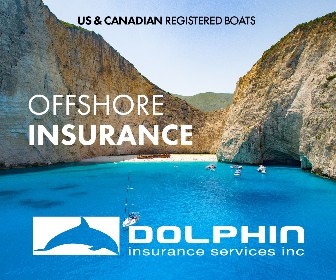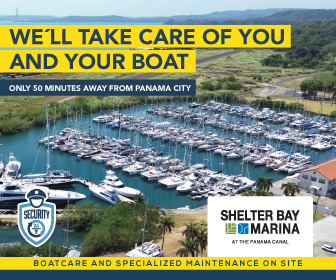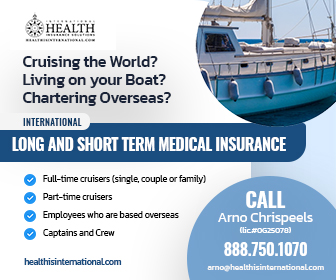Boat Insurance and Salvage: A Cautionary Tale from the Dominican Republic
The unfortunate loss of a boat grounded on a reef in the Dominican Republic demonstrates valuable lessons in how to manage an emergency grounding and how to prepare yourself for such a situation.
Published 4 years ago
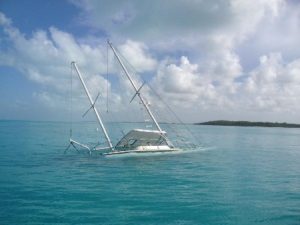

Denise Simpson – DR Regional Joint Host Officer for the OCC and SSCA – reported that the yacht owner tried to contact both brokers to get permission to hire a salvage company as it was not written in their contract. “The salvage company I personally know was contacted by the owner as it was imperative to get the vessel of the reef ASAP,” she explains. “However, the salvage company had had problems in the past rescuing vessels for owners and not getting paid, so the salvage company now seeks prior approval from the broker or payment up front, before commencing any salvage. In this particular case the owner didn’t want to pay the salvage company before getting hold of their broker.
Great efforts were made to assist the yacht by the local cruising community who tried to help find a 24 hour contact number for the broker, but to no avail. Eventually the USA broker picked up their email remotely but it was too late for the salvage company to be of any use. It’s understood the vessel’s owner drained the fuel and removed the engines to protect the environment and salvaged what they could, leaving the hull on the reef to be dealt with at some point in the future.
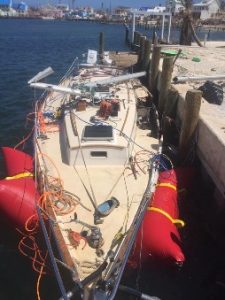

Colin Dawson of Expat Marine Insurance, warns yacht owners that they must do everything possible to minimise a loss or prevent a loss (the old adage that ‘an insured must always act as a prudent uninsured’). He explains; “An insured person is obliged to protect the insurers’ interests as if they were his own, which also includes non admission of guilt, maintaining and manning the yacht properly. Those insured should take steps to protect their yacht or craft and minimise the potential loss to themselves and therefore the insurers. There should have been no reason to need to have the broker or insurers permission to protect the asset and only if the yacht is not in imminent danger should he obtain insurers permission to approve expenses which he intends to pass onto insurers. Indeed, if an owner does not take all reasonable steps to minimise a loss to insurers he could be putting his cover in jeopardy. “
A comment on the DR Cruisers Facebook page reinforces this warning. Duncan McKenzie posted; “I asked my insurers about the (DR) situation and was told that it is well understood by all Yacht Underwriters that they cannot be on call to give advice / instructions 24/7, so when some sort of disaster occurs it is not always possible to contact them. Invariably, a grounding on a reef (or the like) occurs in the middle of the night. The fundamental rule to keep in mind is that, in such circumstances, you need to take all possible steps to limit the damage and safeguard the yacht, which includes accepting an offer to salvage the yacht, if not doing so would result in her being a total loss. In taking such actions, you need to keep in mind that the costs will eventually fall upon your Insurers, which therefore means you need to keep in mind the dangers of prejudicing their position by, e.g., accepting a salvage charge that is grossly inflated / multiples of the actual value of the yacht, for example.”
Mike Wimbridge, Managing Director of Pantaenius UK Limited, said that regrettably it was things like being contactable 24/7 that were often over looked in favour of a cheaper premium.
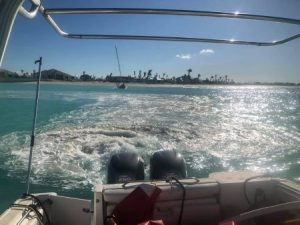

It can be daunting in an emergency having to deal with a salvage company and being asked to pay up front when you have absolutely no idea of the costs involved. Roston McGregor of the Bahamas company Valiant Marine Salvage, gives some helpful advice.
“The first thing to remember, is that if at the end of the day, the salvage award is based on any percentage, that percentage, is of the accessed value of the vessel after the incident; not the purchase price or even the insured value. It’s in everybody’s best interest – the owner, the underwriter and the salvors. This is why a good salvor is motivated to minimize damage and preserve the vessel as well as he can, throughout the operation.
“Traditionally, the percentage awarded for pure salvage, can be up to about 35% but there are many factors, such as the risk to the casualty, the amount of specialized equipment brought to bear to deal with the situation, the risk to the salvors and his equipment. In many parts of the world, environmental protection is another aspect. Pure salvage, is also done on a “no cure, no pay” basis and yes – it’s exactly what that sounds like. So, a salvor has to be very confident in his ability to save the situation, before mobilizing, in such a situation.
“But not all situations or jobs end up being pure salvage. Some work may start out as pure salvage but be renegotiated to a day rate. Some are “day rate” from the beginning with a flat rate – daily for larger scale operations and some times hourly for smaller jobs.
“Something else to remember is that even if you have a membership for a on-water assistance company, there is a limit to what that coverage is and you need to have that clearly in mind. You would do well to call them and find out where a soft ungrounding stops and salvage operations begin. Generally speaking, if the vessel is aground to the point where it takes more than one assist vessel to unground the casualty safely, that may extend beyond the scope of your coverage. If the vessel is in peril or will be in peril where she is aground, that is a factor that may put it into the realm of salvage.
“Being in a position to be needing to call for assistance can be a terrifying experience. Having a stranger com aboard and insist that you sign a salvage contract, in the middle of that situation, if you fully don’t understand what it is that you’re signing, can be just as frightening. The problem is that these situations are often extremely time-critical and inaction can lead to far more damage being inflicted, or even the complete loss of the vessel. It may be at three in the morning on a weekend and your insurance agent or lawyer can’t be reached. Keep in mind, that even if an underwriter advises signing a salvage contract, the decision and responsibility is ultimately up to the owner, or captain of the vessel.”
Takeaway Tips from the Experts:
- Confirm there is an after hours claims line you can call.
- Keep in mind that most insurance brokers don’t have the authority to confirm payment in a claim situation. This would need to come directly from the Underwriter unless there has been some kind of claim settling agreement with the broker before hand, which is rare.
- If something does happen, act like you don’t have insurance, i.e. what should you, as the boat owner, do to minimize the damage and do what it takes to get yourself out of harms way.
- If an incident occurs, take all possible steps to limit the damage and safeguard the yacht, which includes accepting an offer to salvage the yacht, if not doing so would result in her being a total loss.
- When selecting a policy, question what general claims advice you are being given by the broker/insurer and read the fine print.
- Research the topic while you have time. Call and discuss some basic hypothetical situations with your insurance
company (and on-water assistance company if you have one) and get advice
on how to proceed. Even though it may seem morbid, it’s better to have
the knowledge and never need to use it, than to need it and not have it. - Make sure you understand the time zones and language differences when dealing with insurance companies and salvage companies.
- Have cash on board should you need to pay for salvage/rescue up front.
Footnote from Valiant Marine Salvage:
“I’ve seen several claims denied due to either print so fine it was missed, or point so widely spaced, that connections weren’t made”, warns Roston McGregor. “A recent salvage in the Bahamas had their claim denied because the fine print in their policy stipulated that the vessel could not be in the Bahamas for longer than thirty consecutive days. The skipper was told that not only would there be no settlement for his vessel, but also, that he would have to pay the cost of the salvage operation out of his own pockets! Be 100% sure that the coverage that you’re paying for, isn’t inadvertently voided.”
Photos courtesty of Valiant Marine Salvage.
………………………………………………………………………………………………………………………………………
Our thanks to the following for contributing to this article:
- Denise Simpson of DR (Dominican Republic) Sailors/Cruisers Info: https://www.facebook.com/groups/502195700382567
- Expat Marine Insurance: https://www.expathk.com/marine/
- Valiant Marine Salvage: https://www.facebook.com/valiantmarinesalvage
- Pantaenius UK Limited: https://www.pantaenius.com/uk-en/
………………………………………………………………………………………………………………………………………
The opinions expressed in this article are the authors’ own and do not reflect the view of Noonsite.com or World Cruising Club.
Related to following destinations: Bahamas, Dominican Republic, Global
Related to the following Cruising Resources: Cruising Information, Insurance, Planning and Preparation, Safety, Safety and Medical, Yacht Insurance



